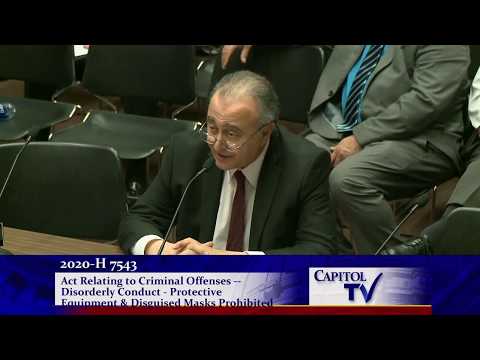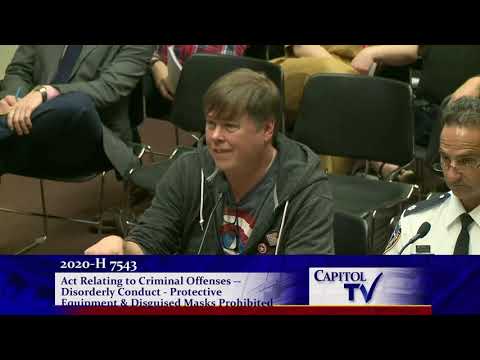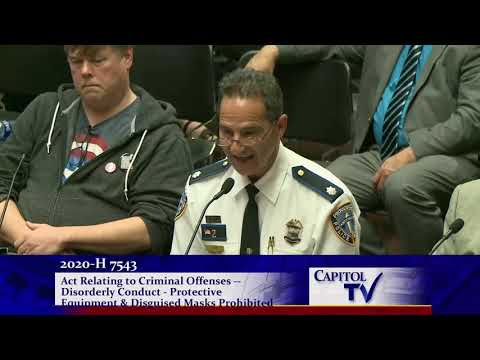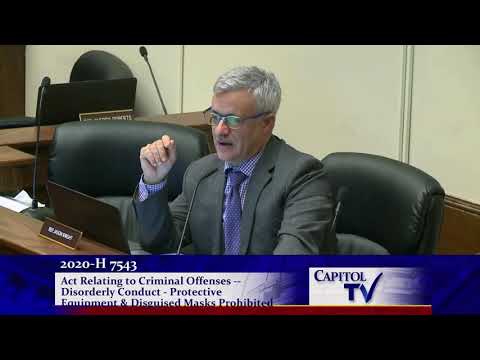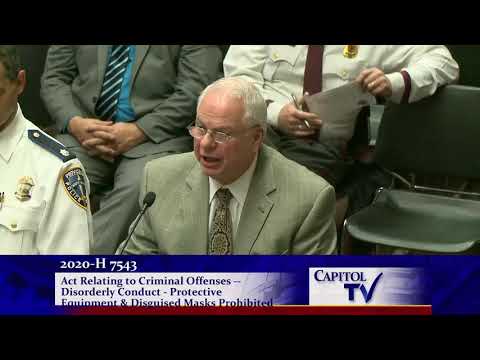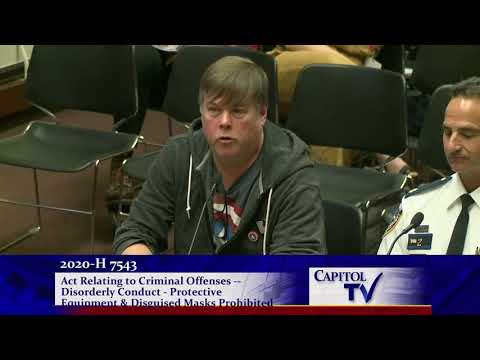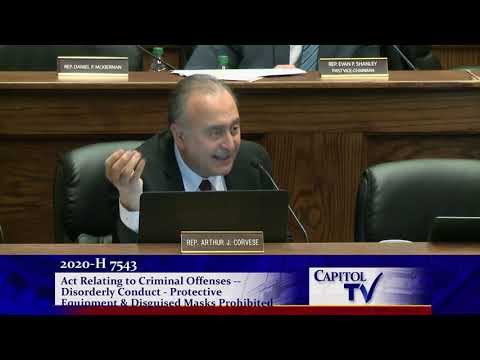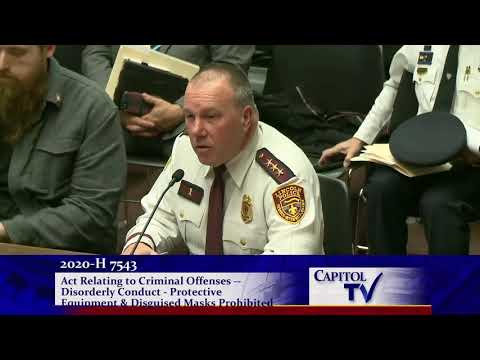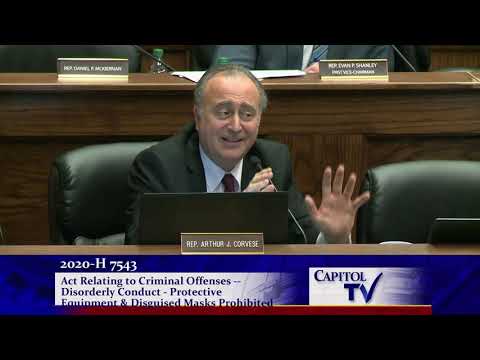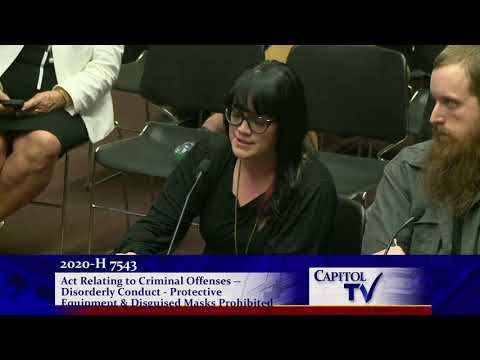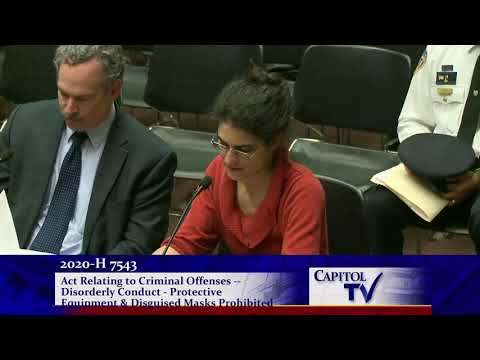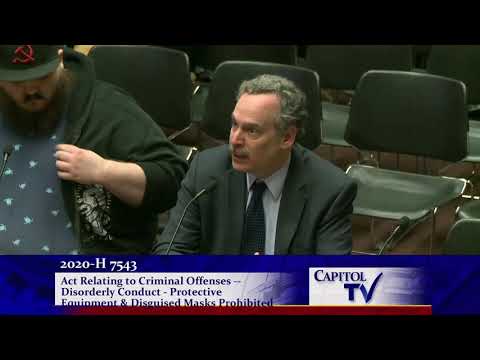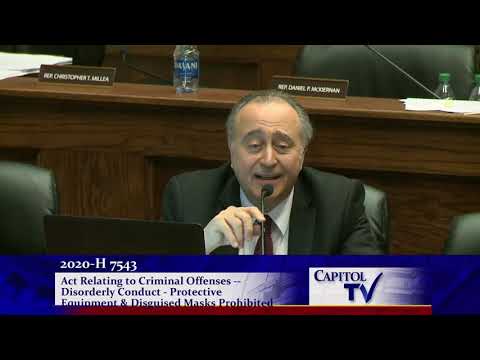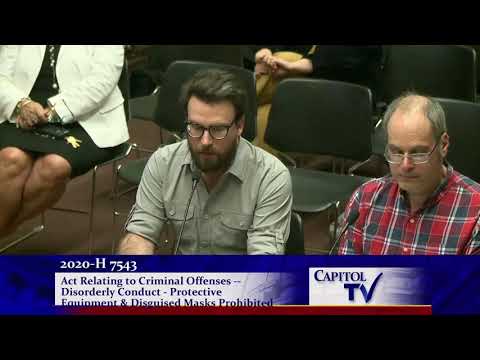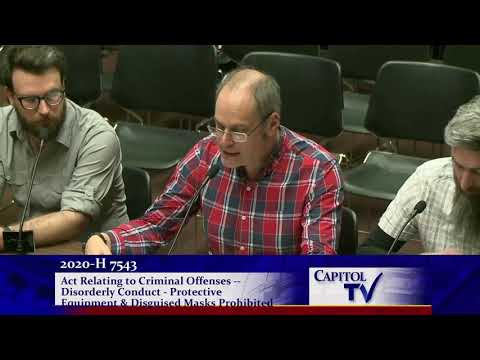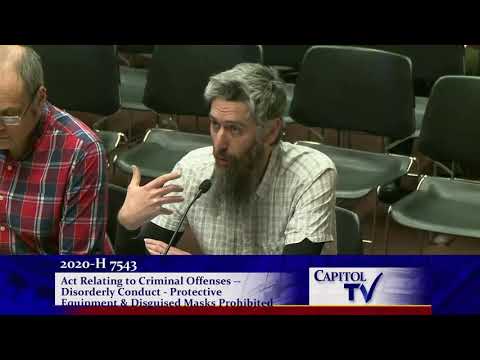Bill to outlaw masks and protective gear at protests heard in House committee
“I don’t understand why you would prohibit knee pads unless you want it to hurt more when a police officer or a fascist forces someone to their knees,” said Providence resident Kate Shapira. The House Judiciary Committee committee heard testimony on H7543 on Tuesday evening. If passed, the bill would “prohibit people at parades, rallies, demonstrations or assemblies from the
March 12, 2020, 1:45 pm
By Steve Ahlquist
“I don’t understand why you would prohibit knee pads unless you want it to hurt more when a police officer or a fascist forces someone to their knees,” said Providence resident Kate Shapira.
The House Judiciary Committee committee heard testimony on H7543 on Tuesday evening. If passed, the bill would “prohibit people at parades, rallies, demonstrations or assemblies from the possession or wearing of gas masks, riot helmets, face visors, body armor, vests, neck protection, knee pads, riot shields or any other equipment meant to defeat law enforcement tactics to control crowds. It would also prohibit attendees from wearing a mask, hood, makeup, robe, helmet, disguise of any type or facial alteration with the intent of avoiding their identification.”
See:
- Bill to unmask protesters will foster fascism
- Corvese bill would ban riot gear on attendees of rallies, parades
Representative Arthur Corvese (Democrat, District 55, North Providence) introduced his bill reading from and paraphrasing his press release announcing the bill:
“We live in very volatile political times. Whether your perspective is derived from television, radio, the newspapers or social media, it is glaringly obvious every day that America is a polarized nation. Members of the extreme right and the extreme left face off every day with words and actions. In certain cities, such as Boston and Portland, Oregon, confrontations between these extremes have turned violent. Local law enforcement officers perform a herculean job in maintaining order while allowing First Amendment rights to be expressed. However, their duty to keep the peace must not be hampered by individuals on both sides of the political divide who are looking to commit violence in the name of their respective causes. This bill would assist our local law enforcement in protecting all participants and maintaining the public peace, while ensuring First Amendment rights are preserved.”
Acknowledging the push back against the bill from first amendment and antifascist activists, Corvese continued, saying
“I know there’s some internet chatter… saying that the genesis of this bill was some creation of the State to hamper individual’s right to protest. That’s not my intention.”
The bill, says Corvese, has been upheld as constitutional in other states, most notably the 2nd Circuit Court in Georgia, though Corvese did admit that similar legislation has been held to be unconstitutional. Later in the hearing, Steven Brown, Executive Director of the ACLU of Rhode Island, noted that Corvese was correct about the mixed decisions in the courts on these types of laws. The ACLU has not had the time to analyze the decisions to determine what makes some laws constitutional and others not.
“The US Constitution is not a suicide pact,” said Corvese, “we don’t express individual freedoms in order to bring down or tear down society.” [Here Corvese, knowingly or not, was touching on philosopher Karl Popper‘s “paradox of intolerance.”]
Members of the public and the ACLU testified against the bill, while representatives from law enforcement testified for it. First up to speak against the bill was this author. Forgive me for quoting myself:
“I oppose this because the safety of those who protest against white ring extremists will be compromised by this bill,” said Uprise RI editor Steve Ahlquist. “The point that Representative Corvese made about their being people on the right and the left who are extremists is perhaps true superficially, but in fact, if we look at the ADL, the Anti-Defamation League, in 2018 they did a report that showed the 53 extremist murders in the United States were all from the right. In 2019, 41 of 42 extremist murders were from the right.
“This idea that there are good people or bad people on both sides of the equation, as President Trump said following Charlottesville, is really not that true. We know that the actual violence comes from extremists on the right it does not come from extremists on the left.
“This idea that we need to surveil people who protest, this is something that Bloomberg was trying in New York after 911. After something like eight years of surveillance of Muslim and left leaning groups, there was not one arrest. Not one case was made. This was a complete waste of time.
“When people go to these protests, and wear masks, when they are confronting violent extremists on the right, they are not wearing masks necessarily to evade detection by the police, although I can defend that position too, to an extent, what [these activists] are doing is preventing themselves from being doxxed.
“What doxxed means is having your identity revealed on extremist websites, which cause people to feel very unsafe. I myself, who does not wear a mask when I go to a protest, and I go to virtually every protest in Rhode Island, and I’ve been to many of the protests in Boston where there have been problem – I have been doxxed. People put my name on right wing websites with my name and other personal information.
“The implied threat is that you’re not safe. Your views, your political views and stances – these are things that make you unsafe. I’m a relatively privileged person, I have a pretty high profile in the state so I like to think that I’m relatively safe – but if you’re not that person, if you’re a person with many marks against you – If you’re a person of color, if you’re a person on the LGBTQ spectrum, if you’re a person defending yourself, who feels the necessity to stand up to right-wing extremism, actual, real-life Nazis in Rhode Island, who were out here, on [the State House] lawn… the idea that you can’t wear a mask to protect yourself from people on the other side who… are the precursors to lynch mobs, the precursors to right wing fascism really growing in this country – is really problematic.
“It means that fewer people go out to confront [right-wing extremists]. They start to grow and things get worse. It doesn’t get better when we don’t confront them. Letting them have their rallies does not make us safer. Confronting them does.
“If this legislature really wants to do something about right-wing extremism, or any kind of extremism, when these events happen and people get to together and say, ‘We want to do something about this,’ – If legislators here came out [and stood with the community], then we would be safer, because the police would be there to protect these legislators.
“If you came out and said, ‘You know, we decry this kind of right-wing intolerance. We decry people who put Jews and LGBT people and people of color down, immigrants down, if you came out and stood with people, maybe then this legislature could do something about it.
“But passing laws that basically make us more unsafe? That’s wrong.
“The people who are directly affected by these [fascist] groups – who are first in line when they take political power – We are doing something about this. I identified myself, in a piece about this legislation – I said I am anti-fascist. We talk about antifa – we say that are just as bad as fascists. They are not just as bad. That’s a false equivalence. If you’re not antifa – If you’re not antifascist, what does that make you? There’s not Switzerland in this thing. We know where fascism goes. We have historical evidence from about 80 years ago – we know what happens when fascists take power.
“So you don’t get to be Switzerland. You don’t get to say there’s good people on both sides. You have to pick a side.”
“Attending protests, mass protests, dressed for battle, should be prohibited,” said Deputy Chief Tom Verdi of the Providence Police Department. “The primary mission of the police department at a mass demonstration or a protest is public safety. We protect people first and property second.
“Attending demonstrations wearing gas masks, body armor, ballistic helmets, and other like equipment endangers public safety. Why else wear it? Unless you intend or intended to cause violence, or expecting violence, why else wear it?”
Representative Jason Knight (Democrat, District 67, Barrington, Warren) noted that the case Corvese referenced earlier was Church of the American Knights of the Ku Klux Klan v Kerik which upheld a law banning masks.
Tony Capezza, Rhode Island state director of the International Brotherhood of Police Officers, seconded everything Deputy Chief Verdi said in his testimony.
I took exception to Deputy Chief Verdi’s contention that people wearing protective gear were their dressed for battle. People wear protective gear simply to protect themselves. All the points I tried to make were much more eloquently expressed by Kate Schipira, in video 11 below.
A bit of a back and forth here between Representatives Thomas Noret (Democrat, District 25, Coventry) and Corvese and myself, that talked about body cameras, the use of cameras at protests to intimidate and surveill, and whether or not wearing a mask or other forms of protective gear shows intent to commit crimes, during a protest.
Lincoln Police Chief Brian Sullivan, who serves as the President of the Rhode Island Police Chief Association also dittoed Deputy Chief Verdi’s points.
“Where these laws matter is not in their intention when they are written, it’s in the material impacts when they are actually passed,” said Dan Kittredge. “These measures have been passed in several states and they have had chilling effects on protests.
“We have leaked emails from police departments in Portland [Oregon] and New York where members of the police departments were working and liaising with members of these far right groups to give them information on where they had intelligence on where left wing protests would be and allow them into these areas without searching them for weapons so they could engage in violence against these protesters.
“These are not neutral bills in their effect, even if they are in their intention.”
Challenging the false equivalence that there are bad actors on the right and the left, Kittredge said, “We have numerous occasions of people being doxxed at these protests on the left and then subsequently facing violence and harassment… This is not a hypothetical situation, this is what antifascist protesters are facing every day. There are murderous right-wing terrorist groups who use the information revealed by people being unmasked in areas with these laws to create kill lists in order to attack members of antifascist organizations.
“There is no equivalent on the left. there is no violent, murderous left-wing group out there being arrested by the FBI for plotting attacks…
“This sort of a law will – whether it has that intent or not – will depress turnout for these events and prevent people from showing up and executing their constitutional right to oppose fascism.
Kittredge noted the irony of this bill be put forward at the same time another bill is being introduced adding correctional officers to the list of people allowed to have extra tinted windows on their motor vehicles. We are being told, said Kittredge, that police and correctional officers have a right to privacy, “those rights are important for them, but they are not important for the general public. And that to me is a pretty dangerous double standard.”
Representative Corvese denied that the two bills have anything to do with each other, and added that he does not support the tinted windows bill.
Representative Knight acknowledged that some police departments across the country and in our past have had bad actors working with right wing hate groups, but added, “those are the outliers.” Drawing on his experience as a prosecutor and defense lawyer, Knight noted that “the misconduct that you speak of, I’ve never seen or experienced in Rhode Island.”
“Masks protect us from being photographed by people who use that to find us,” said Mary Hennessy. “So they find us and they terrorize us at our homes or worse, they find us while we’re out in public and murder us with their vehicle, like what happened in Portland recently.”
Mary Hennessy is a victim of right-wing violence at a protest nearly two years ago on the State House lawn. She is still dealing with the physical and emotional scars of that incident.
Hennessy is immunocompromised, and this bill, she said, will prevent her from wearing a medical mask. “this bill essentially criminalizes immunocompromised and ill people engaging in political action. We will no longer have the option to politically engage and exercise our rights.
“If I catch the flu, I could die. Even being here tonight is a huge risk for me, but I strongly oppose this bill.”
“Do we want people to be at risk from deadly weapons?” asked Providence resident Kate Schapira. “I really don’t understand the logic. If a weapon is deadly, surely the risk is coming from the person who is holding the weapon, not the person who is trying to avoid being hurt or killed. By putting this law in place the state would be declaring that it wants to make civilian people, exercising first amendment rights, more vulnerable to violence, either by violent militias, like the ones that have been mentioned here, or by city and state police.
“I assume that the prohibition of face masks and knee pads and so on does not extend to police officers. When the deputy chief spoke up earlier, he said that people wearing the kind of protective gear that is described in the bill are expecting to cause violence. Why wear it, if you’re not going to cause violence?
“Why are the police wearing it, if the purpose of wearing that gear is to signal that you’re going to cause violence?
“I believe that people are wearing that gear because they are expecting to receive violence.
“I don’t understand why you would prohibit knee pads, as far as I know, it’s unlikely you would hit somebody with a knee pad. I don’t understand why you would prohibit knee pads unless you want it to hurt more when a police officer or a fascist forces someone to their knees.
“I don’t understand why you would prohibit knee pads unless you want it to hurt more when a police officer or a fascist forces someone to their knees and I don’t understand why the people of this state, as represented by the people sitting here, would want to increase violence and the effects of violence and that is what this law will do. If you pass it, that is what you’re saying you want for our state.
“You’re saying you have no problem with people who initiate violence and come to our communities intending to stir up violence, but you want to punish people who want to minimize its effects on ourselves and our communities.
“I believe that passing this bill will make it easier for fascists who do both advocate and perpetrate violence to operate if you pass this bill. And I believe you will also make it easier for police officers who do abuse their public trust to do so.”
“There’s something especially problematic about a bill like this that bans masks solely in the context of engaging in core political speech,” said Steven Brown of the ACLU. “It’s in the context of a demonstration, parade or rally – That’s the only time that this ban occurs, and we think that because it’s aimed directly at first amendment activity, that in our view makes it much more constitutionally problematic.”
Brown went on to reiterate the right to protest anonymously having a long history in the United States, back to the founding of the country.
Brown finally noted that recently there was a commemoration of Bloody Sunday, where police turned billy clubs and German Shepherds against peaceful civil rights protesters. “Under this bill, the crime would be for those individuals to try to protect themselves with protective clothing and that is simply inappropriate.”
“I’d like to acknowledge the very real risk to personal safety that every individual who has come up here and spoken out against this bill,” said Will Speck, co-chair of the Providence Chapter of the Democratic Socialists of America. Antifascist protesters wear masks to avoid being identified by hate groups, said Speck. “We’re not wearing masks because it looks cool, we’re not wearing it because we want to hide our face from the cops – We have no illusions that we can hie ourselves from police who have such extensive surveillance tools.”
Antifascists wear protective gear, “because we understand fascists,” said Speck. We understand their violent nature. We understand that they want nothing better than to hurt us. So we are not going to make it easy for them to hurt us. And I think it is our right to protect ourselves.”
Speck and Corvese exchanged heated words, but Speck’s main point was that bringing large crowds to oppose fascism is the best way to counter their hateful message.
“We wear seat belts even though we don’t get into our cars every day expecting to cause an accident,” said Andrew Wright. “We wear a seat belt in case someone else causes an accident that we’re involved in. If someone goes to a protest wearing a helmet, they don’t necessary expect to be attacking other people, but they may have a legitimate concern that they will be attacked…
“People who choose not to be injured for expressing their human rights shouldn’t be criminalized for not wanting to be hurt.”
“This is the most unconstitutional rights bill I’ve seen in my time testifying on bills,” said Randall Rose, a Rhode Island rights activist. “There’s absolutely no part of it that is justified. Every single clause is written in a way to make peaceful protesters more vulnerable.”
Rose cited the long history of using gas masks in peaceful protests. Rose noted that gas masks may have helped the peaceful protesters outside the Wyatt Detention Center, who were assaulted by prison guards.
Rose further noted that the organizers of the first Pride march felt in true danger of their lives from the Providence Police.
As for wearing a mask or make-up to hide one’s identity, Rose said “I don’t want to have somebody who is transgender subject to criminal charges because they wear makeup and the police and prosecutors say they were trying to hide their identity.”
“A lot of people who come to protests, particularly these protests against white nationalist, are coming because thy are from a population that is disadvantaged in some way and is judged to be ‘unfit,'” said Providence resident Alex Taylor, the last person to speak on the bill. “The whole program of the white nationalists is that there’s a set of people who are real people and everyone else should be disadvantaged or exterminated, depending on the boldness of their claims.”
Noting that many protests can go from lawful assembly to unlawful assembly, Taylor said that this law could suddenly come into full effect part way through a protest, when the police decide to declare the assembly unlawful. In the chaos of such a situation, a reasonable person may not know that their previous innocuous behavior has not become criminalized.
Taylor also addressed Representative Knight’s point about trusting that local law enforcement is better than the worst elements in other times and places in our country. “people who are going to abuse their authority don’t come with labels,” said Taylor. “And people who come to protests don’t know how to interpret [a police officer] who is 6’5 and dressed in riot gear. That is a very intimidating situation and it’s very hard to read. Expecting people who are exercising their first amendment rights to put all their faith forward, I think that’s a big ask.”




